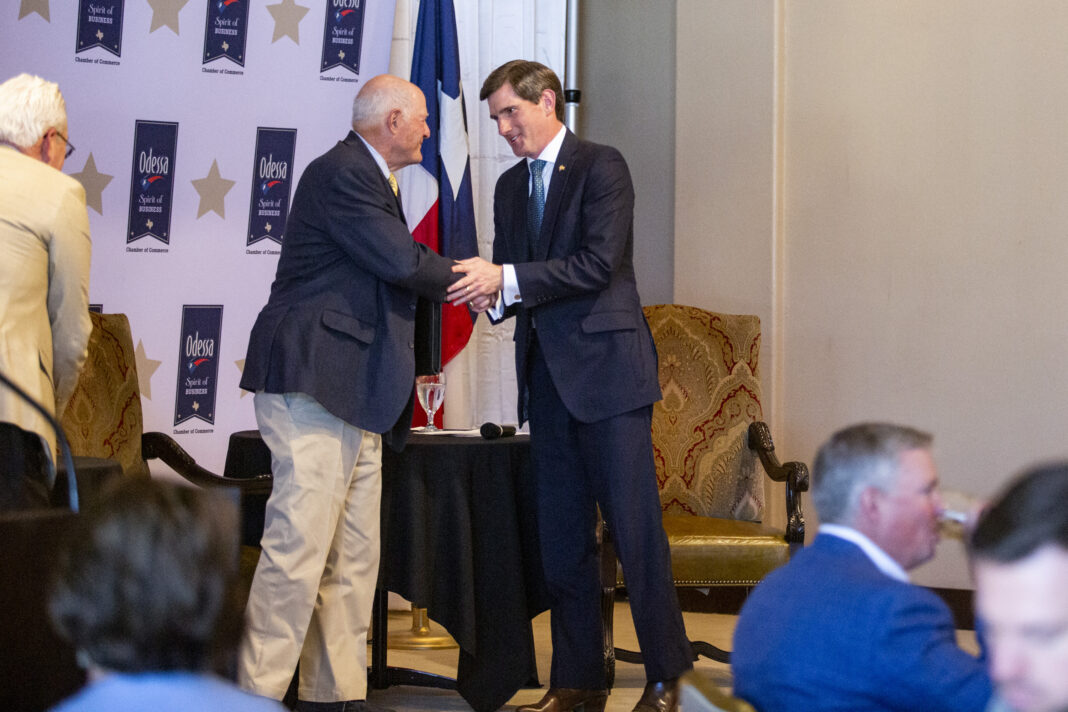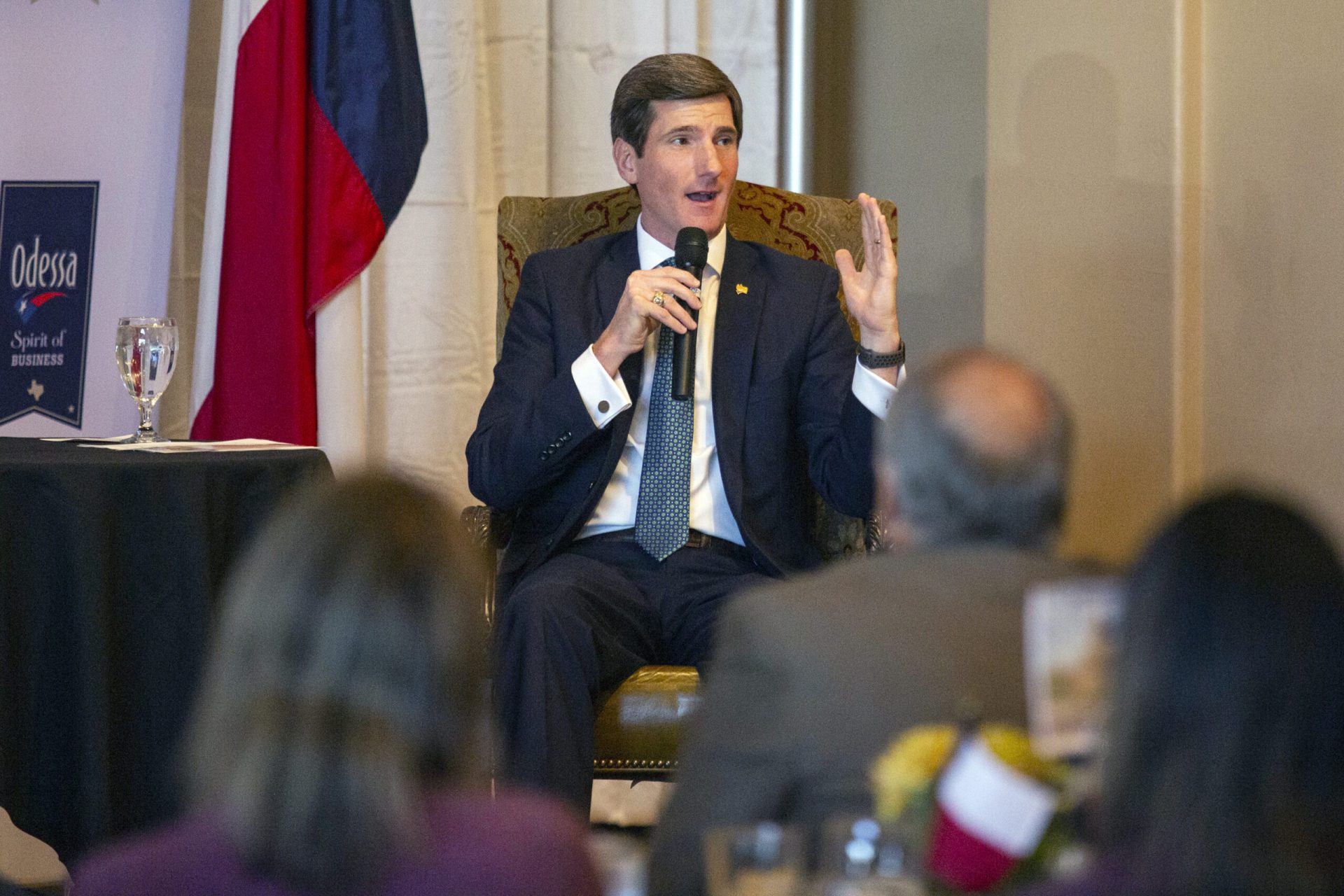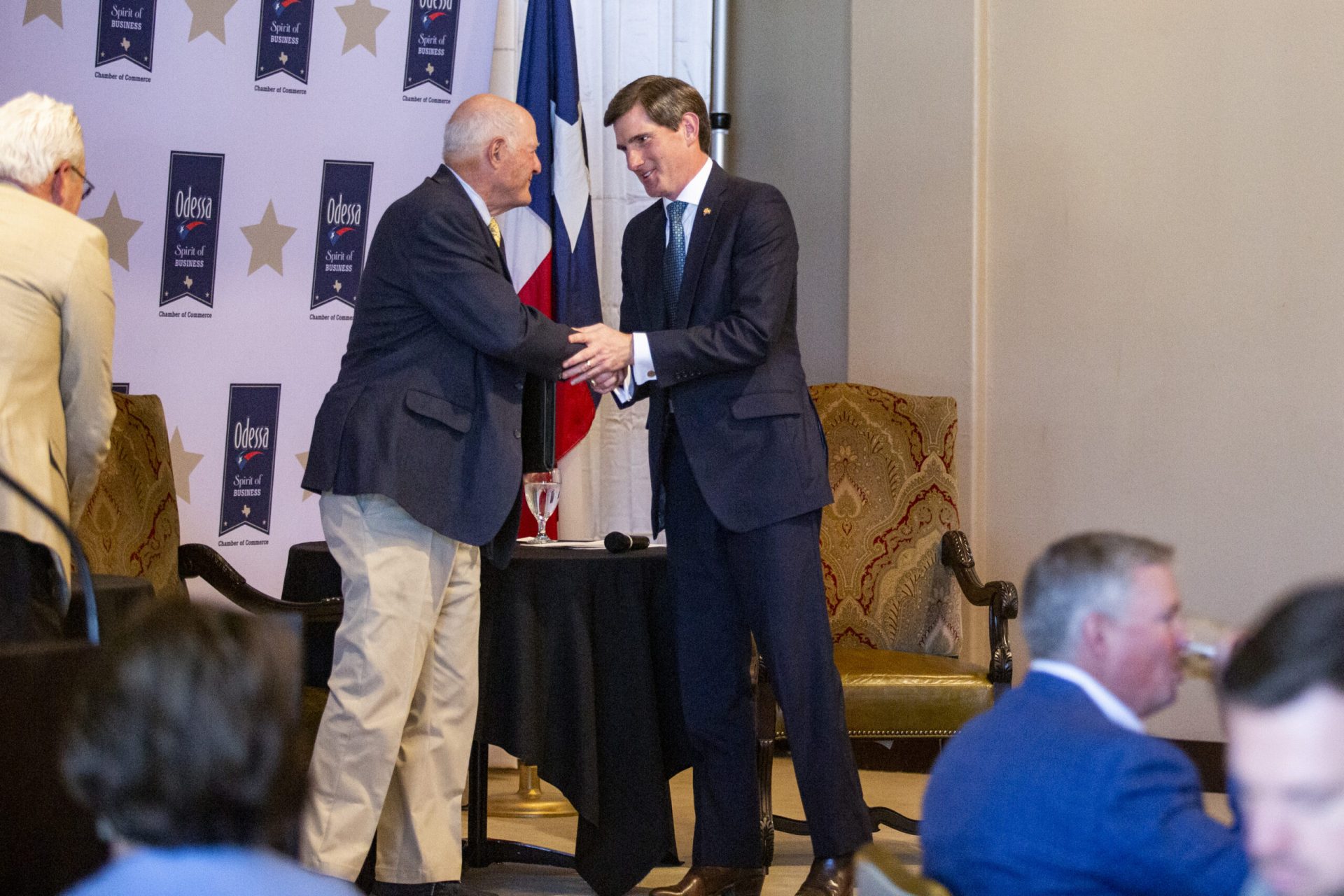Funding to renovate the Mesa Building at University of Texas Permian Basin, added mental health care capacity and keeping up with the pace of transportation needs were just some of the topics tackled by state Sen. Kel Seliger and Rep. Brooks Landgraf.
Seliger, an Amarillo Republican, and Landgraf, an Odessa Republican, spoke during a Legislative Update Luncheon at the Odessa Country Club Tuesday organized by the Odessa Chamber of Commerce.
Moderated by Pat Canty, regional vice president and publisher of the Odessa American, it was attended by about 200 people.
Both lawmakers hit the highlights of the regular and special legislative sessions.
Seliger noted efforts to add more mental health beds to the Permian Basin.
Basin legislators and hospital CEOs worked together to bring what will be a behavioral health facility that will be located between Odessa and Midland as soon as 2024.

Landgraf said the Permian Strategic Partnership also was involved along with Seliger and Rep. Tom Craddick, R-Midland, Midland Memorial Hospital, Midland Health, Medical Center Hospital and the Ector County Hospital District Board.
Senate Bill 8, legislation directing how the state will spend federal dollars allocated to Texas under the American Rescue Plan Act of 2021, was passed out of the House and Senate in October. The legislation includes $40 million for a behavioral health center that will be constructed and operated by the hospital districts of Midland and Ector County.
“That’s one thing that this region needs is the ability to treat mental health and I think this is going to be a compounding effect. Not only are we going to be able to treat people who need that type of treatment and don’t have good access to it now, it’s going to create teaching opportunities for University of Texas Permian Basin, for the Texas Tech University Health Sciences Center, for Odessa College, for Midland College. It’s really going to revolutionize the way we can treat mental health in the Permian Basin and it’s something that we’ve been poorly equipped to do up to this point,” Landgraf said.
Landgraf also noted the passage of HB 103, the Leilah Hernandez Act to create the Texas Active Shooter Alert System.
In a news release after its passage, Landgraf said this alert system “could have saved the lives of some of my constituents back in 2019, like high school student Leilah Hernandez. The goal of this legislation is to save lives and prevent mass violence while protecting the constitutional rights of law-abiding Texans.”
Seliger added that a bill providing $45 million in tuition revenue bonds for UTPB was passed in the last session.

“Something you can really be proud of is UTPB will probably get more per dollar than any other institution in the state of Texas and it shows,” Seliger said.
Landgraf said the Mesa Building is one of the oldest buildings on campus and “it’s absolutely showing its age.”
“UT Permian Basin has undergone transformative growth in recent years and we want to make sure the facilities on campus reflect that dynamic growth so we think that’s going to help further the mission of the university and the great work that they’re doing,” Landgraf said.
He added that transportation infrastructure has always been important to him.
“We are keeping our record-breaking funding for transportation infrastructure here in the Permian Basin, particularly in the Odessa TxDOT district, which covers 12 counties here in the Permian Basin. The oil patch is a different animal. We have different transportation needs and we have to treat the oil patch differently and we have to make sure that our infrastructure growth is being accommodated. We have great talent in our region that can help build the roads. We just need to make sure that they’re getting the resources. I guarantee that every dollar the state of Texas invests in our highway infrastructure, particularly in a place like the Permian Basin, we’re going to get a return on that investment,” Landgraf said.
On redistricting, Landgraf said West Texas is keeping all 16 of its Texas House of Representative seats, all the Texas Senate seats in West Texas and all four rural U.S. Congressional seats.
The composition of the districts has changed, though, as some counties have been moved out and others in.
“But it’s absolutely important that we keep our voices, we keep them strong in the halls of the Texas Capitol and the U.S. Capitol and through the redistricting process we were able to do that. That’s also something I’m very proud of,” Landgraf said.
Seliger noted that a bill he carried, and was passed with Landgraf’s help, says if you are going to lease to the federal government, you have to inform local officials. This occurred in May when the federal government moved unaccompanied migrant children to what was a man camp in Midland County.
The camp closed in June.
Landgraf said there were “tremendous victories” in pro life and Second Amendment issues.
“Texas has stepped up and we’ve made unprecedented commitments to spending on border security and in light of not having assistance from the federal government to do that. I support those. I support the election integrity bill and I think those are important and I think we have a lot of people here in Ector County and Odessa that believe those are big, important, priority issues. I wanted to make sure that my vote and my work on that reflects the views that prevail in our county,” Landgraf said.
Despite some controversy on some of these issues, Landgraf said he thinks they were able to address Second Amendment and right-to-life, for example, as well as bread and butter matters.
On the power grid, Landgraf said Texans deserve better than what they got during winter storm Uri in February.
“… We did quite a bit through Senate Bill 2, Senate Bill 3 and then a whole host of others to impose new weatherization requirements, to change the way that ERCOT and PUC are governed … Those are very important reforms,” but he said they are about half way there.
He said they should use their time between now and 2023, the next legislative session, to take an even deeper dive to make sure they come up with policies that provide long-term solutions to make sure that a catastrophic grid failure like we saw in February never happens again. …,” Landgraf said.
“And shame on us if we don’t take care of that,” he added.










